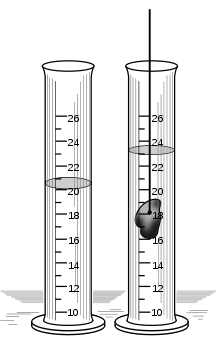- Displacement (fluid)
-
 Two graduated cylinders containing water, one with a rock submerged in it, showing the increased water level due to displacement
Two graduated cylinders containing water, one with a rock submerged in it, showing the increased water level due to displacement
In fluid mechanics, displacement occurs when an object is immersed in a fluid, pushing it out of the way and taking its place. The volume of the fluid displaced can then be measured, as in the illustration, and from this the volume of the immersed object can be deduced (the volume of the immersed object will be exactly equal to the volume of the displaced fluid).
An object that sinks displaces an amount of fluid equal to the object's volume. Thus buoyancy is expressed through Archimedes' principle, which states that the weight of the object is reduced by its volume multiplied by the density of the fluid. If the weight of the object is less than this displaced quantity, the object floats; if more, it sinks. The amount of fluid displaced is directly related (via Archimedes' Principle) to its weight.
In the case of an object that sinks (is totally submerged), the volume of the object is displaced. In the case of an object that floats, the amount of fluid displaced will be equal in weight to the displacing object.
Applications of displacement
Commonly called water displacement, this method can be used to measure the volume of a solid object, even if its form is not regular. Several methods of such measuring exist. In one case the increase of water level is registered as the object is immersed into the water. In the second case the object is immersed into a vessel full of water, causing it to overflow. Then the overflown water is collected and its volume measured. In the third case the object is suspended under the surface of the water and the increase of weight of the vessel is measured. It is equivalent to the weight of the amount of water that has the volume equal to the one of the suspended object.[1]
The weight of an object or substance can be measured by floating a sufficiently buoyant receptacle in the cylinder and noting the water level. After placing the object or substance in the receptacle, the difference in weight of the water level volumes will equal the weight of the object.It is a method
See also
References
Categories:- Physical quantities
- Fluid mechanics
Wikimedia Foundation. 2010.
